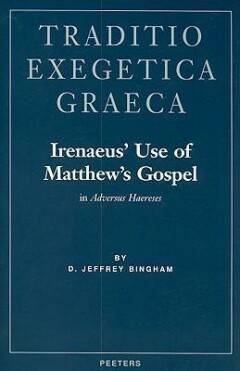
- Afhalen na 1 uur in een winkel met voorraad
- Gratis thuislevering in België vanaf € 30
- Ruim aanbod met 7 miljoen producten
- Afhalen na 1 uur in een winkel met voorraad
- Gratis thuislevering in België vanaf € 30
- Ruim aanbod met 7 miljoen producten
Zoeken
Omschrijving
This book shows how Irenaeus creatively selects and develops distinctive Matthean material, within his interpretive networks of other biblical texts in order to verbally and conceptually oppose the theses of the heretics and provide helpful language for his expression of the church's faith. He is attracted to this Matthean material not because it holds an extraordinary place in the canon, but because in his view each gospel makes a distinctive, but equal contribution to the church's canon and polemic. Irenaeus sees some of Matthew's distinctive contributions in terms of language which emphasizes Christ's humanity and virgin birth, explains the theological and economical unity of the two covenants, and opposes the heretics' cosmological, anthropological, Christological, theological, and economical dualism. Although the bishop works within the framework of the church's tradition, the interpretive inter-textual networks he builds, his magnification of particular terms, and his polemic against dualism demonstrate his creative, anti-heretic innovation. Rarely, does he ever merely repeat the thought of a predecessor. Irenaeus exegetes Matthew for the church within a particular milieu, using a methodology of inter-textual connection common to his milieu, and developing theological language which counters the heretics of his milieu.
Specificaties
Betrokkenen
- Auteur(s):
- Uitgeverij:
Inhoud
- Aantal bladzijden:
- 357
- Taal:
- Engels
- Reeks:
- Reeksnummer:
- nr. 7
Eigenschappen
- Productcode (EAN):
- 9789068319644
- Verschijningsdatum:
- 1/01/1997
- Uitvoering:
- Hardcover
- Formaat:
- Genaaid
- Afmetingen:
- 165 mm x 244 mm
- Gewicht:
- 748 g

Alleen bij Standaard Boekhandel
+ 118 punten op je klantenkaart van Standaard Boekhandel
Beoordelingen
We publiceren alleen reviews die voldoen aan de voorwaarden voor reviews. Bekijk onze voorwaarden voor reviews.











